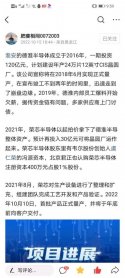No wonder the Chinese are disinterested and NOT panicking because they know the American SOOOO WELLLL....lol
The chip manufacturer cheered on a $76 billion subsidy package for the industry, then announced capital spending cuts and mass layoffs while maintaining payouts to shareholders.
Just a couple of months after Intel’s effort succeeded in winning microchip companies billions of dollars in no-strings-attached corporate subsidies, Intel is reportedly planning to lay off thousands of workers.
The potential layoffs come only weeks after the company a shareholder dividend at the same rate as the previous few quarters — amounting to a total of about in annual dividends.
The sequence of events confirms warnings about the so-called CHIPS Act from a vanishingly small number of critics who cautioned that without changes, the legislation would let companies use the money to finance payouts to wealthy investors, and would not obligate the companies to expand their investments in domestic jobs.
And yet, those critics were ignored by politicians and pundits of both parties eager to shovel federal money to a handful of powerful tech companies. Indeed, when Sen. Bernie Sanders (Ind.-Vt.) to those subsidies — including a ban on stock buybacks, a cap on executive pay, a government equity stake, and union neutrality provisions — he was thwarted by Democratic leaders.
At the time, Democrats blocking Sanders’ initiative were bolstered by Intel CEO Pat Gelsinger, who insisted that if the legislation did not pass immediately, the company could factories overseas and hold up already-planned investments.
When lawmakers ultimately passed the bill in July, Intel abruptly began changing its rhetoric about new domestic investments: That very same day, the company on capital spending by billions of dollars, but still intended to issue a “strong and growing dividend” for shareholders.
The Biden administration has not yet announced which companies will be receiving the CHIPS Act subsidies, and for what projects. Before the legislation passed, Intel to be a primary beneficiary of the subsidies.
Now Sanders’ original warnings are being realized in the form of a new report in Bloomberg News.
“Intel Corp. is planning a major reduction in headcount, likely numbering in the thousands, to cut costs and cope with a sputtering personal-computer market, according to people with knowledge of the situation,” Bloomberg October 12. “Some divisions, including Intel’s sales and marketing group, could see cuts affecting about 20 percent of staff, according to the people.”
Bloomberg reports that the move is a likely attempt to shore up profits, as Gelsinger suggested on a recent earnings call. “We are also lowering core expenses in calendar year 2022 and will look to take additional actions in the second half of the year,” Gelsinger said.
Intel’s Multi-Billion Bait And Switch
Oct 14, 2022•The chip manufacturer cheered on a $76 billion subsidy package for the industry, then announced capital spending cuts and mass layoffs while maintaining payouts to shareholders.
Just a couple of months after Intel’s effort succeeded in winning microchip companies billions of dollars in no-strings-attached corporate subsidies, Intel is reportedly planning to lay off thousands of workers.
The potential layoffs come only weeks after the company a shareholder dividend at the same rate as the previous few quarters — amounting to a total of about in annual dividends.
The sequence of events confirms warnings about the so-called CHIPS Act from a vanishingly small number of critics who cautioned that without changes, the legislation would let companies use the money to finance payouts to wealthy investors, and would not obligate the companies to expand their investments in domestic jobs.
And yet, those critics were ignored by politicians and pundits of both parties eager to shovel federal money to a handful of powerful tech companies. Indeed, when Sen. Bernie Sanders (Ind.-Vt.) to those subsidies — including a ban on stock buybacks, a cap on executive pay, a government equity stake, and union neutrality provisions — he was thwarted by Democratic leaders.
At the time, Democrats blocking Sanders’ initiative were bolstered by Intel CEO Pat Gelsinger, who insisted that if the legislation did not pass immediately, the company could factories overseas and hold up already-planned investments.
When lawmakers ultimately passed the bill in July, Intel abruptly began changing its rhetoric about new domestic investments: That very same day, the company on capital spending by billions of dollars, but still intended to issue a “strong and growing dividend” for shareholders.
The Biden administration has not yet announced which companies will be receiving the CHIPS Act subsidies, and for what projects. Before the legislation passed, Intel to be a primary beneficiary of the subsidies.
Now Sanders’ original warnings are being realized in the form of a new report in Bloomberg News.
“Intel Corp. is planning a major reduction in headcount, likely numbering in the thousands, to cut costs and cope with a sputtering personal-computer market, according to people with knowledge of the situation,” Bloomberg October 12. “Some divisions, including Intel’s sales and marketing group, could see cuts affecting about 20 percent of staff, according to the people.”
Bloomberg reports that the move is a likely attempt to shore up profits, as Gelsinger suggested on a recent earnings call. “We are also lowering core expenses in calendar year 2022 and will look to take additional actions in the second half of the year,” Gelsinger said.

